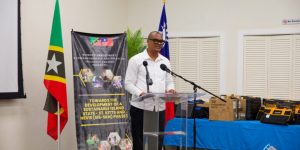Fair Share Initiative Faces Controversy, Confusion, and Exclusion Claims.
The longstanding issue of revenue sharing between the islands of St. Kitts and Nevis has resurfaced, sparking controversy and raising questions about transparency and fairness within the federation. Nevis Premier Mark Brantley recently revealed that while progress is seemingly being made on the “Fair Share” issue, the Nevis Island Administration (NIA) was excluded from the development of a crucial World Bank report on revenue sharing. This report, intended to address the historical imbalance in revenue distribution between the two islands, was presented to the NIA without prior consultation or collaboration, raising concerns about the legitimacy of the process and the accuracy of the data presented.
Premier Brantley, while acknowledging some forward movement on the issue, expressed significant reservations about the World Bank report. The report presented several revenue-sharing scenarios, and the NIA has identified a preferred model. However, discrepancies emerged between the report’s figures regarding Citizenship by Investment (CBI) revenue allocated to Nevis and the NIA’s own records. Further adding to the NIA’s concerns are unexplained deductions categorized as “national obligations,” which lack transparency and raise suspicions about potential manipulation of the figures. The lack of consultation with the NIA, a key stakeholder in the revenue-sharing arrangement, casts a shadow over the entire process and undermines the spirit of cooperative federalism.
The irony of the situation lies in the fact that Prime Minister Dr. Terrance Drew, now presented as a partner in dialogue, oversaw a process that has been criticized for resembling a unilateral audit rather than a collaborative effort. This approach has fueled perceptions of disregard for Nevis’ autonomy and its right to be involved in decisions directly impacting its financial well-being. Premier Brantley emphasized the need for mature and deliberate discussions to resolve the revenue-sharing issue, contrasting this approach with what he perceives as media theatrics. However, the exclusion of Nevis from the report’s development raises questions about the transparency of the process and the right of the Nevisian public to understand the rationale behind the proposed revenue-sharing models.
The current situation in St. Kitts and Nevis contrasts starkly with other Caribbean territories. Smaller islands like Montserrat, Anguilla, the British Virgin Islands, and the Turks & Caicos Islands possess greater representation and more clearly defined fiscal frameworks. This disparity highlights the bureaucratic inertia and political maneuvering that continue to plague the St. Kitts and Nevis federation, hindering its progress towards a more equitable and transparent revenue-sharing arrangement. The lack of a clearly defined framework contributes to the ongoing tension and mistrust between the two islands, impeding their ability to work together for mutual benefit.
Looking ahead, the NIA plans to submit its preferred revenue-sharing proposal to the federal government. The critical question remains whether this proposal will be given serious consideration or, like previous attempts, be sidelined due to political maneuvering. The people of Nevis are closely watching the developments, expecting a fair and equitable resolution to the long-standing issue. The concept of a “fair share” should not remain a mere slogan but must be enshrined in law, guaranteeing a just and transparent distribution of resources between the two islands.
The current developments mark a critical juncture in the revenue-sharing debate between St. Kitts and Nevis. The lack of consultation, the discrepancies in figures, and the opaque deductions have created an environment of distrust. While Premier Brantley maintains a diplomatic stance, the underlying tension is palpable. The success of future negotiations hinges on the federal government’s willingness to engage in genuine dialogue, address the NIA’s concerns, and ensure a transparent and equitable revenue-sharing framework that respects the rights and interests of both islands. The “revenue reckoning” has indeed begun, and its outcome will significantly impact the future of the federation.
Share this content:










Post Comment